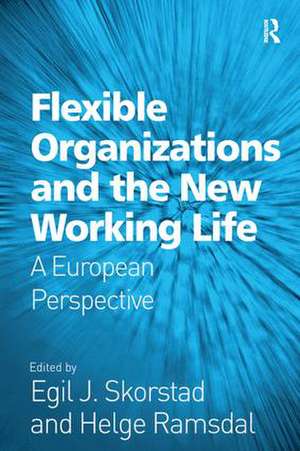Flexible Organizations and the New Working Life: A European Perspective
Autor Helge Ramsdal Editat de Egil J. Skorstaden Limba Engleză Hardback – 28 mar 2009
Preț: 824.17 lei
Preț vechi: 1105.29 lei
-25% Nou
Puncte Express: 1236
Preț estimativ în valută:
157.71€ • 168.64$ • 131.49£
157.71€ • 168.64$ • 131.49£
Carte tipărită la comandă
Livrare economică 18 aprilie-02 mai
Preluare comenzi: 021 569.72.76
Specificații
ISBN-13: 9780754674207
ISBN-10: 0754674207
Pagini: 288
Dimensiuni: 156 x 234 x 23 mm
Greutate: 0.69 kg
Ediția:1
Editura: Taylor & Francis
Colecția Routledge
Locul publicării:Oxford, United Kingdom
ISBN-10: 0754674207
Pagini: 288
Dimensiuni: 156 x 234 x 23 mm
Greutate: 0.69 kg
Ediția:1
Editura: Taylor & Francis
Colecția Routledge
Locul publicării:Oxford, United Kingdom
Notă biografică
Egil J. Skorstad is Professor of Organizational Studies at the Østfold University College, Norway. Helge Ramsdal is Professor of Political Science and Organization Theory at Østfold University College, Norway. He has held positions at the University of Bergen and as a senior researcher at Østfold Research Foundation.
Recenzii
'Few terms have generated as much enthusiasm and controversy in recent years as the notion of "flexibility." This book provides a useful contribution to our understanding of this important concept through empirical studies of the variety of ways that organizations seek flexibility in diverse cultural and institutional settings in Norway, France, Italy, the UK, and Sweden.' Arne L. Kalleberg, University of North Carolina at Chapel Hill, USA 'An important contribution to a highly contentious area of working life, bringing new light to bear on organisational flexibility from an international perspective and showing differing penetration across Europe depending upon organisational culture and employment legislation. Grounded in sound empirical research and drawing upon a range of research projects, this will be essential reading for scholars of work and organisations as well as students of business, economics, sociology and organizations.' Claire Wallace, University of Aberdeen, UK and European Sociological Association '... this anthology can be warmly suggested to anyone, who wants to read not one more conceptual essays about 'flexible', 'intelligent', 'boundaryless', 'network', 'post-bureaucratic', 'post-modern' etc. organizations, but to read a work from a European perspective full of empirical evidence and reflecting thoughts.' Management Revue 'It is clearly aimed at an academic audience and has an ambitious target of clarifying the complexity and ambiguity of organisational flexibility. It will therefore be a useful source of information for those pursuing research in this area.' Work, Employment and Society
Cuprins
Preface; Introduction, Helge Ramsdal and Egil J. Skorstad; The ambiguity of flexibility, Egil J. Skorstad; The impact of flexibility on employee morale and involvement: large-sample findings for UK workplaces, Michael Rose; Whose flexibility? British employees' responses to flexible capitalism, Harriet Bradley; A package of flexibility?, Birgitta Eriksson and Jan Ch. Karlsson; Protected, firm-specific, and scarce: explanations of non-standard forms of employment, R. Oystein Strom; Combining flexibility and workers' motivation: lessons from a study on Italian and French hospitals, Philippe R. Mosse; Striving for flexibility, attaining resistance: culture clashes in the Swedish rail industry, Henrietta Huzell; The re-organization of manufacturing and the emergence of a flexible economy in the UK, Stephen Ackroyd; The quest for flexibility and governmental regulations of working life: the case of the 2005 Norwegian worker protection and working environment act, Helge Ramsdal; What's special about the Nordic countries? On flexibility, globalisation and working life, Tor Claussen; Concluding remarks. The complex dynamism of the flexible organization, Egil J. Skorstad; Index.
Descriere
What are we actually talking about when we talk of flexibility in organizational settings? Do flexible forms of organization lead to varied, challenging and autonomous work or do they have a negative impact on working conditions? These questions are confronted by a group of specialist authors, who discuss the concept of flexibility in relation to employment practices, organizational structure, cultural peculiarities and network arrangements in France, Italy, Norway, Sweden and the UK.











